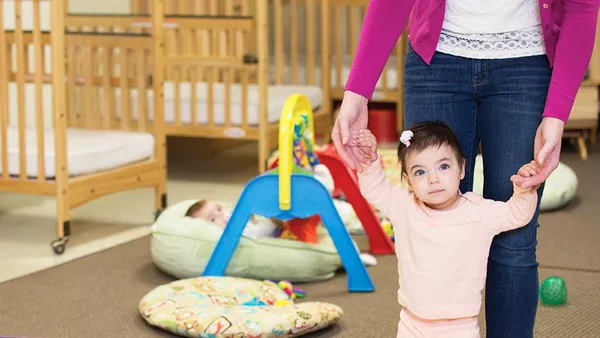The first six months of a baby’s life are an extraordinary period of rapid growth and development. As babies reach the six-month mark, they undergo significant changes across multiple domains, including physical, cognitive, social, and emotional development. Understanding these essential milestones is critical for parents and caregivers to provide appropriate support and ensure the baby’s healthy progress. In this comprehensive guide, we’ll explore the key milestones in each area and offer insights into fostering their growth during this critical period.
Physical Milestones
Gross Motor Skills: At six months, most babies can sit with support, showing improved head control and stability. They may also start to experiment with rolling over from their tummy to their back and vice versa. Some babies may even begin attempting to sit unsupported, though this is still a skill in progress. Additionally, with assistance, many infants can bear weight on their legs while in a standing position, showcasing the gradual development of their leg muscles and balance.
Fine Motor Skills: As their hand-eye coordination improves, six-month-old babies start reaching out for objects with precision. They can grasp toys and other items using a palmar grasp and are fascinated by exploring the texture and shape of objects by putting them in their mouths. Furthermore, infants at this age may begin transferring objects from one hand to the other, refining their fine motor abilities.
Cognitive Milestones
Object Permanence: At six months, babies start to grasp the concept of object permanence, meaning they understand that objects continue to exist even when they are out of sight. This developmental milestone is a crucial foundation for memory and problem-solving skills.
Exploratory Behavior: Curiosity is a driving force in a baby’s cognitive development. At six months, infants become increasingly interested in their surroundings and actively explore objects using their senses. They shake, bang, and manipulate toys and other items to understand their properties, fostering their curiosity and learning abilities.
Babbling: Six-month-olds engage in vocal play, experimenting with various sounds and tones. Babbling is an essential precursor to language development and helps babies practice using their vocal cords and mouth muscles.
Social Milestones
Recognizing Familiar Faces: At six months, babies can distinguish familiar faces, showing excitement and happiness during interactions with their primary caregivers and other frequent companions. Their smiles and animated reactions to familiar people demonstrate their growing emotional connection with others.
Smiling and Laughter: Infants become more socially responsive, frequently smiling and laughing in response to social cues and interactions. These expressions of joy and amusement are essential for building positive social bonds.
Separation Anxiety: Around six months, babies may begin to experience separation anxiety when separated from their primary caregivers. This reaction is a normal part of social and emotional development, indicating their attachment and need for a secure bond.
Emotional Milestones
Expressing Emotions: At this stage, babies become more expressive with their emotions. They may display happiness, frustration, and even anger more overtly, showing signs of emotional growth.
Attachment: Emotional bonds with primary caregivers deepen as babies rely on them for comfort and security. Providing a nurturing and loving environment is crucial to building a secure attachment, which has long-lasting effects on a child’s emotional well-being.
Conclusion
Understanding the developmental milestones for a 6-month-old baby is essential for parents and caregivers to provide appropriate support and foster their growth effectively. From physical achievements like sitting and grasping to cognitive milestones like object permanence and babbling, each step marks an exciting phase in a baby’s journey toward becoming a thriving individual. Embrace this precious time, providing a stimulating environment and celebrating their accomplishments to ensure a healthy and happy developmental trajectory.


